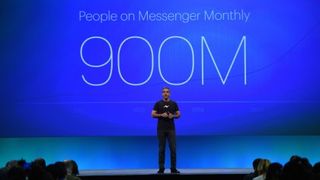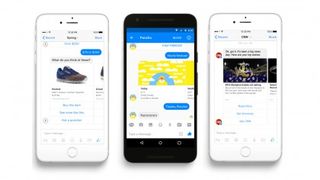Why bots are taking over your phone
Apps are so 2015. The future of mobile is bots

Go where the people are
If bots were created a few years ago, they might take the form of new apps. Today, things are a little different.
Data collected by comScore in its 2015 US Mobile App Report shows that even though the average smartphone user visits 25 apps a month, half of the time they spend on an app is in their most used one. The time spent on apps after Number 1 drops dramatically.
Under-used apps tend to be relegated to the back folders of our devices. I personally don't like to download an app only to have it live on the 15th page of my phone. I want to have a few apps that do everything I need. I want to consolidate.
Turns out, big apps like Facebook Messenger want me to consolidate, too.
Messenger is one of the most popular apps ever, according to comScore, and for good reason: Facebook has essentially made it a one-stop shop, allowing users to chat with friends, exchange money and even hail an Uber. (Oh, and there was the minor matter of forcing people to download it that helped boost its numbers.)

Audience seekers like theScore see this app centralization happening, and they're keen to go where people are spending most of their time.
"Messaging apps are huge," Levy says. "This is the way the next generation of mobile users is communicating and interacting with each other, and it was a total no-brainer for us to be there.
Get daily insight, inspiration and deals in your inbox
Get the hottest deals available in your inbox plus news, reviews, opinion, analysis and more from the TechRadar team.
"While we don't know for sure how well bots will be adopted, we do know there's a gigantic potential audience out there for those that create the best experience."
The bot bet
Bots could replace countless apps that currently do nothing but gather digital dust and eat up space on your phone.
All you need is a prominent messaging app, and voilà!, a bot is at your beck and call.
"Bots allow you to do a simple task like reserve a hotel room, get your boarding pass, or print a photo without having to be encumbered with downloading an app," David Parry, senior innovation manager at HP, tells me. HP also announced a bot for Messenger last week.
"Many customers either do not want to download another app or have space for one," Parry continues.
Simplifying the mobile experience has a nice ring for customers, but businesses stand to benefit from bots as well.
As Levy of theScore notes, bots give companies a whole new way to reach readers or customers through an app that most of them probably already have and use frequently.
Instead of having to pour money into making an app, businesses can spend a lot less dinero to pay a developer to build a text-based bot that will work across multiple operating systems on apps used by hundreds of millions of people, as articulated by chat app Kik Founder Ted Livingston.
Of course, bots are a win for the likes of Facebook and Microsoft because they keep users on their platforms. These firms - of which Google may soon join - are basically handing bot-building tools to developers and saying, "Go, make these."
Now that we're on the frontier of this brave new bot world, the possibilities are endless. OK, maybe not endless, but the potential of bots to impact our lives is real.
"[Bots] will be able to handle administrative tasks both personally and for work without you having to worry about those chores," says HP's Parry. "The best bots will be those that take care of you and your daily needs."
The future may seem a little lazier, but bots could eliminate many mundane tasks as well as help us more deeply and readily engage with the world around us. I'm excited to see where bots take us, and how many apps I can start deleting from my phone.
Christian is a writer who's covered technology for many years, for sites including Tom's Guide, Android Central, iMore, CNN, Business Insider and BGR, as well as TechRadar.
